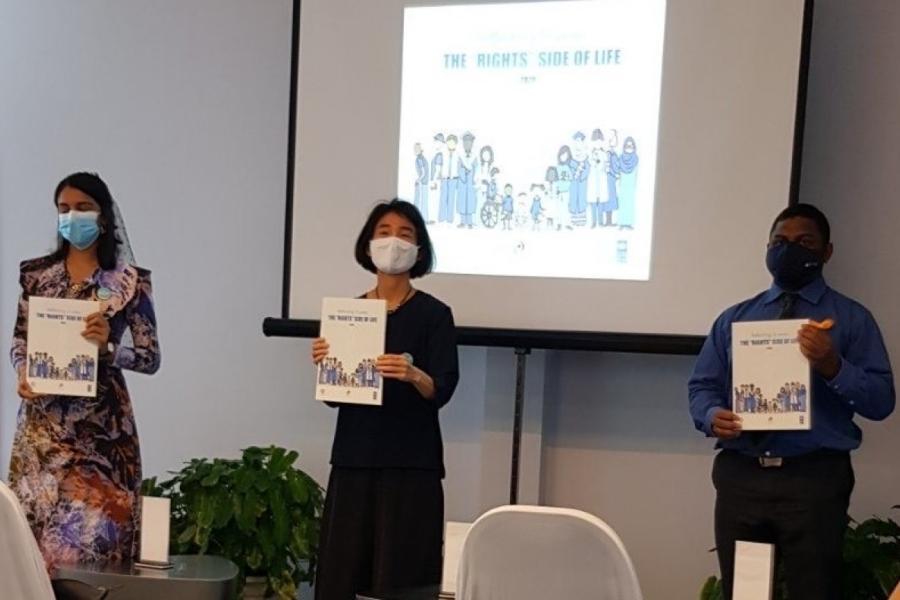Reflecting 15 years, The “Rights” Side of Life 2020 Survey Launched
10 December 2020
- The findings of the third “Rights” Side of Life Survey - a continuation of two previous surveys conducted by the Human Rights Commission of the Maldives (HRCM) in partnership with United Nations Development Programme (UNDP) was launched today to coincide with Human Rights Day.

The “Rights” Side of Life is a human rights survey to understand attitudes, awareness and perceptions of the public on a range of human rights issues in the Maldives. The latest survey conducted together with the Family Protection Authority (FPA) also focused on examining the knowledge, perceptions and prevalence of domestic violence in the Maldives.
The survey collected data on these areas to understand the current situation in the country and provide insights on the extent of the additional work required to address any shortcomings. The information helps prioritize future directions for human rights promotion, prevention of domestic violence and assists in identifying areas for more research.
“We hope that the findings of this survey will contribute to strengthen the efforts in protecting and promoting human rights in the Maldives. In this regard we will reflect on this survey in formulating our strategies and plans to deliver our constitutional mandate and overcome the challenges faced in protecting human rights. In addition, we plan to build upon the findings of the survey to enhance the roles and functions of the Commission and to regain the public confidence in the institution. It is our sincere hope that this survey will be beneficial for all State Institutions mandated to ensure the provision of human rights and other human rights actors promoting and protecting human rights,” said Human Rights Commissioner, Shifaath Razzaq.
The survey report highlights human rights concerns that have magnified over the years. For instance, the support for gender equality and women’s rights have diminished, and there is a worrying increase in the number of women who did not respond to questions regarding equal rights in the family unit and child custody matters. There is growing concern regarding child sexual abuse - an issue consistently highlighted in all three surveys. The report also reveals the need for more transparent and accountable governance institutions and greater awareness of human rights across the country.
Some of the key findings from the survey report include:
1. An increase in public awareness of HRCM at 84.8% in 2019 compared to 40.8% in 2005.
2. Only 36.5% of respondents were able to name five human rights, suggesting a decline from 45.1% in 2011.
3. Corruption (21.0%) and lack of trust between political parties (20.0%) were considered the leading factors undermining the success of the democratic process.
4. There were worrying responses from a considerable number of people who felt that gender equality and child rights are not compatible with Islam. And it’s concerning that most of these respondents were women.
5. The number of male respondents who agree that others outside the family should intervene if a man mistreats his wife increased from 48.2% in 2005 to 59.1% in 2019.
6. 93.6% of the respondents affirmed child sexual abuse of girls as a serious issue, while 91.7% of the respondents affirmed child sexual abuse of boys as a serious issue.
7. 40.9% of respondents are dissatisfied with the protection and services assured for persons with disabilities.
8. 23% of the respondents believe that the most important area to ensure the rights of the elderly was to prevent neglect of elderly persons, while 11% of respondents believe it is the need to prevent abuse of the elderly.
9. Majority (63.6%) of the people were dissatisfied with overall health services and especially those from outer islands (62.3%).
10. The number of respondents dissatisfied with the judiciary accounted for at 56.3% of the respondents. Most commonly cited reason for the loss of judicial confidence pertained to corruption at 39.2%.
11. Almost half (46%) of the respondents were convinced that the government was taking adequate measures to improve housing services.
12. More than half (59.0%) of the respondents were dissatisfied over the allocations of resources between administrative atolls and islands.
13. There has been a considerable decrease in the number of people (7.9%) working for more than 12 hours when compared to 20.0% in 2005.
14. Fewer women (11.0%) reported earning a salary over MVR 15,000 in comparison to that of men (17.6%).
15. Majority (80.0%) of people said that they knew where to lodge complaints for domestic violence.
16. Most women responded that their husbands were the perpetrators of domestic violence, while most men reported having suffered abuse from previous partners.
"It is crucial that we all do our part to protect and promote core fundamental rights such as the right to life and to bodily integrity that is entitled to all human beings," stated Chief Executive Officer of the Family Protection Authority, Aminath Leena Ali.
The findings of the survey are intended to provide a basis for policy-making and agenda setting to strengthen systems that promote and protect human rights and the rule of law in the Maldives.
“The nation’s efforts to promote and protect human rights while working towards the achievement of the Sustainable Development Goals continue to be challenged by the fragility of the social and political fabric of the country. In the face of these challenges, the third Right Side of Life survey provides valuable data in initiating discussions and dialogues around human rights, state obligations and citizen responsibilities,” said UNDP Resident Representative, Akiko Fujii.
Read the full Report here




